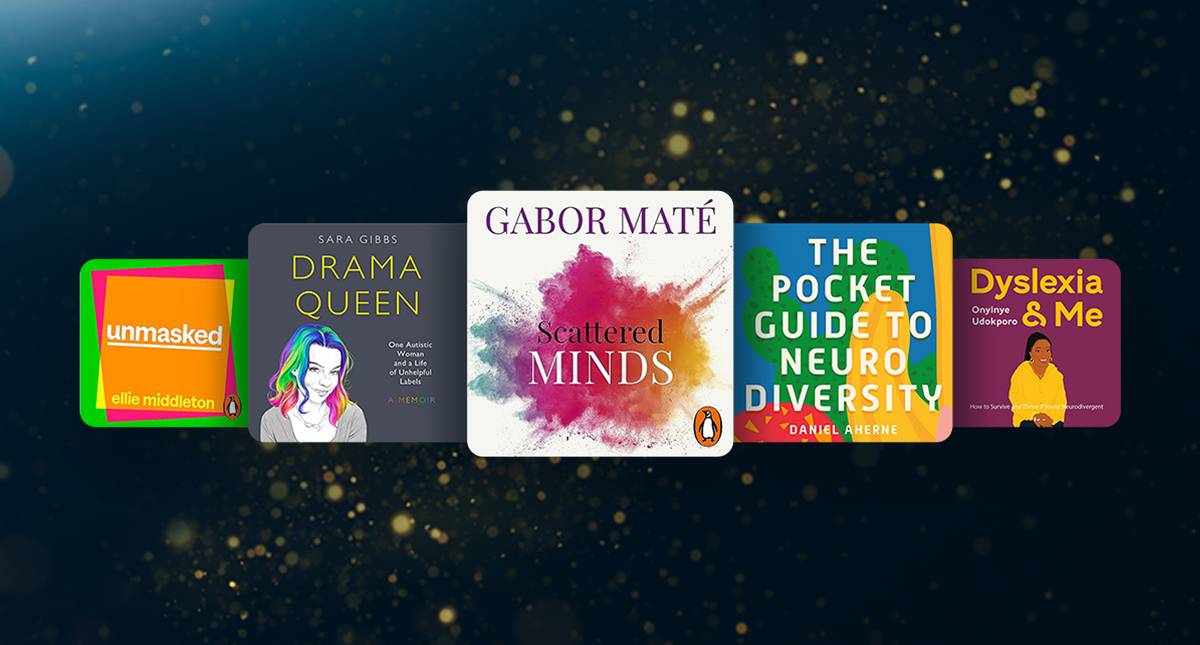And yet, neurodiversity is still poorly understood, and much of society is set up to only make neurotypical people comfortable. But things are changing, as more people from all backgrounds share their stories and as research into the various aspects of neurodiversity increases.
From memoirs to manifestoes via accessible scientific books, these audiobooks all provide an insight into neurodiversity, and push all of us, whether we are neurodiverse or not, to consider how to make society a more inclusive place.
What exactly does it mean to be neurodivergent? If this is a question you have asked, then The Pocket Guide to Neurodiversity, by expert speaker and trainer Daniel Aherne, is the place to begin. It clearly introduces neurodiversity and its four most common identities: autism, ADHD, dyslexia and dyspraxia. Daniel, who has ADHD, demystifies neurodiversity and emphasises the importance of getting the environment right for neurodivergent people, rather than expecting them to adapt to the neurotypical world. Straightforward, concise and clear, this is for anyone wanting to understand neurodiversity and foster most inclusive spaces.
According to the National Autistic Society, more men are diagnosed as autistic than women, and “many autistic women and girls are missed or misdiagnosed” partly because “society's understanding of autism has been limited by outdated stereotypes and incorrect assumptions”. Harvard and Berkeley-educated writer and entrepreneur Jenara Nuremberg’s Divergent Mind is one of a number of recent audiobooks that sheds light on women’s experiences of autism. In Divergent Mind, narrated by Tegan Ashton Cohan, Jenara explores how neurodivergence presents differently in women and how, thanks to a system that focuses on diagnosing younger, male populations and the fact that girls are conditioned from a young age to blend in and conform to gender expectations, women often don't learn about their neurological differences until they are adults, if at all.
Ten percent of the UK population is believed to be dyslexic, according to the British Dyslexia Association. Among them is entrepreneur and speaker Onyinye Udokporo, who shares her story of growing up dyslexic in a society where “neurodivergence was always presented as a white male issue”. Diagnosed when she was 11, Onyinye tells listeners about how she started a business the following year, gained a scholarship to a prestigious boarding school and went on to complete two degrees by the age of 22. But she also touches on the difficulties she faced, from bullying and anxiety to systemic racism in the educational sector. In her empowering audiobook, Onyinye also shares the practical tips and strategies she used for thriving with dyslexia and overcoming her difficulties in reading and writing well.
Ellie Middleton was 24 when she got a diagnosis of ADHD and autism, and since then has made it her mission to change how society thinks about neurodivergence. In Unmasked, she addresses mental health, pretty privilege, how to navigate the workplace and the importance of self-diagnosis, among other topics, with the aim of making neurodivergence better understood and celebrated.
Comedy script writer Sara Gibbs infuses her memoir and the story of her journey to finding out she’s autistic with humour and warmth. She describes growing up with labels like cry baby, scaredy cat and the titular drama queen – all given to her because no one understood her behaviour and reactions. It was only aged 30 that she was told she had always been autistic. Drama Queen deals with grief, love and more, and is a story about how, with the right support, accommodations and understanding, autism isn’t a barrier to a full life.
Kaiya Stone has dyslexia and dyspraxia. In her memoir, Kaiya tells listeners about her experiences, including struggling at school, her diagnosis at university, and performing a one-woman stand up show inspired by her journey. Funny and honest, Everything is Going to be K.O. is an uplifting book about the frustrations of having specific learning difficulties, as well as the ways in which they have fueled Kaiya’s creativity.
Pete Wharmby is an autistic speaker, writer and tutor whose audiobook explains how autistic people experience the world, from its noise and flashing lights to unspoken assumptions and unwritten rules, among other things. Untypical clearly sets out how exhausting it is to try and fit in with a world not designed for you, and advocates for practical changes we can all adopt to make the world a better place for autistic people to navigate. This is an essential read for anyone who wants to be part of the solution to making society better for everyone.
Author and psychologist Thomas Armstrong PhD offers a new understanding of neurodiversity in his audiobook, which is narrated by Mike Lenz. Thomas argues that if neuropsychological disorders are a part of the natural diversity of the human brain, they cannot simply be defined as illnesses. He explores the evolutionary advantages, special skills, and other positive dimensions of these conditions. The Power of Neurodiversity is perfect for anyone looking to learn more about neurodivergence.
Award-winning science writer Steve Silberman’s Neurotribes unearths the secret history of autism and discovers why the number of diagnoses has soared in recent years. Narrated by William Hope, Neurotribes goes back to the earliest autism research and chronicles the brave and lonely journey of autistic people and their families through the decades. In this audiobook, exclusive to Audible, Steve maps out a path towards a more humane world for people with learning differences.
Laura James had forged a career, married twice and raised four children before she found out she was autistic. Odd Girl Out tracks the year of Laura’s life after she received a definitive diagnosis of autism from her doctor, and describes how she learns that 'different' doesn't need to mean ‘less'. Drawing on her professional and personal experiences, Laura reflects on her life in the light of her diagnosis, which for her explained some of her differences. Odd Girl Out, narrated by Louiza Patikas, is poignant and personal, and a timely account of a woman negotiating the autistic spectrum.
A combination of cutting-edge research, personal insights and exercises for self-expression, Unmasking Autism is a look at the phenomenon of masking, in which autistic people are forced to mask who they are and pass as neurotypical. This is particularly true, says the book, for women, people of colour, trans and gender non-conforming people in whom autism remains significantly undiagnosed. In Unmasking Autism, Devon makes an argument for radical authenticity and non-conformity, urging people to uncover their true selves and help build a new kind of society.
Bestselling author and speaker Gabor Maté turns his attention to attention deficit disorder (ADD), which he himself has, for his latest audiobook. In Scattered Minds, he brings together research and his years of experience as a doctor to take a look at ADD and the myths surrounding it. He arms parents with information to help them understand what makes their ADD children tick, and adults with ADD to gain insights into their emotions and behaviours, as well as presenting a programme of how to promote neurological development in both children and adults.
















